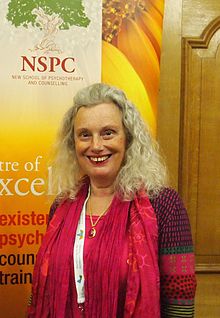This article includes a list of general references, but it lacks sufficient corresponding inline citations. (February 2023) |
Emmy van Deurzen (born 13 December 1951 in The Hague, Netherlands)[1] is an existential therapist. She developed a philosophical therapy based in existential-phenomenology.
Emmy van Deurzen | |
|---|---|
 | |
| Born | 13 December 1951 |
| Nationality | Dutch |
| Occupation(s) | Existential therapist, professor |
Biography edit
van Deurzen was born and raised in The Hague, in The Netherlands, then went to France to study, where she earned two master's degrees, one in philosophy, at the University of Montpellier, where she studied with Michel Henry, and one in clinical psychology, at the University of Bordeaux, during which time she was supervised by Dr. François Tosquelles. She wrote her thesis on phenomenology and psychiatry in relation to solitude and loneliness for her philosophy dissertation and on attempted suicide for her clinical psychology thesis.[2] She worked as psychotherapist in France, then moved to the UK in 1977, where she became involved in antipsychiatry activism and worked for some time with R. D. Laing.[2] She came to her own version of existential therapy, and started teaching at Antioch University, after which she moved to Regent's University London when the program moved there, joining the Regent's faculty when the program was incorporated into the college.[2]
She published her first book on her approach in 1987 and the next year founded the Society for Existential Analysis (SEA) and its Journal of Existential Analysis.[2][3] After she left Regent's, she founded the New School for Psychotherapy and Counselling, and a conflict resolution centre.[2] In 2005 she became an honorary professor at the University of Sheffield.[4] She did her PhD on Heidegger's concepts of authenticity and inauthenticity and their relevance to psychotherapy, at City University, London. She has published widely on existential therapy and her work has been translated into twenty plus languages. She contributed numerous ideas to existential therapy, including that of the four worlds model and the emotional compass.
In 2014 she and her husband Prof Digby Tantam, created the Existential Academy, a community interest company, in West Hampstead, where they offer five masters programmes and two doctoral programmes in conjunction with Middlesex University, as well as a range of short courses. (www.existentialacademy.com)
Honours edit
As listed by the University of Sheffield.[4]
- 2007–2008 - Visiting Associate, Darwin College, Cambridge University
- 2006 – Fellow, United Kingdom Council for Psychotherapy
- 2005 – Honorary Fellow, Swedish Association for Existential Psychotherapy (SEPT)
- 2005 – Honorary Professor, University of Sheffield
- 2001 – Fellow, British Association for Counselling and Psychotherapy (BACP)
- 1999 – Fellow, British Psychological Society (BPS)
- 1999–2002 - Official Delegate to the Council of Europe, for the European Association for Psychotherapy (EAP)
- 1998–1999 - Chair of the British Psychological Society, Psychotherapy Section
- 1998 – Honorary European Certificate for Psychotherapy
- 1997–1999 - Chair of the Universities Psychotherapy Association (UPCA)
- 1995–2002 - European Association for Psychotherapy (EAP) Ambassador
Books edit
- Rising from Existential Crisis: Living Beyond Calamity, (2021) Monmouth: Monmouth: PCCS books.
- Wiley World Handbook for Existential Therapy, (2019) Co-edited with Craig, E., Schneider K. Längle, A., Tantam, D. and du Plock, S, London: Wiley
- Existential Therapy: Distinctive Features, London: Routledge. (2018) Co-authored with Claire Arnold-Baker, London: Routledge
- Skills in Existential Counselling and Psychotherapy, 2nd Edition (2016). Co-authored with Martin Adams, London: Sage.
- Paradox and Passion in Psychotherapy, Second Edition (2015). Chichester: Wiley
- Existential Perspectives on Relationship Therapy (2013). Edited with Susan Iacovou, London: Palgrave Macmillan.
- Existential Psychotherapy and Counselling in Practice, Third Edition (2012), London: Sage Publications
- Existential Perspectives on Coaching (2012). Co-edited with Monica Hanway, London: Palgrave, Macmillan
- Skills in Existential Counselling and Psychotherapy (2011). Co-authored with Martin Adams, London: Sage Publications
- Everyday Mysteries: A Handbook of Existential Psychotherapy, Second Edition (2010), London: Routledge
- Existential Perspectives on Supervision (2009). Co-edited with Sarah Young, London: Palgrave Macmillan
- Psychotherapy and the Quest for Happiness (2008), London: Sage Publications
- Dictionary of Existential Psychotherapy and Counselling (2005). With Raymond Kenward, London: Sage
- Existential Perspectives on Existential and Human Issues (2005). Edited with Claire Arnold-Baker, Basingstoke: Palgrave, Macmillan
- Existential Psychotherapy and Counselling in Practice, Second Edition (2002), London: Sage
- Paradox and Passion in Psychotherapy (1998), Chichester: Wiley
- Everyday Mysteries: Existential Dimensions of Psychotherapy (1997), London: Routledge
- Existential Counselling in Practice (1988), London: Sage
References edit
- ^ "Emmy Van Deurzen". Archived from the original on 2011-10-20. Retrieved 2011-09-22.
- ^ a b c d e Kass, Sarah A. (11 March 2013). "Don't Fall Into Those Stereotype Traps". Journal of Humanistic Psychology. 54 (2): 131–157. doi:10.1177/0022167813478836.
- ^ "History and Philosophy". The Society for Existential Analysis. Archived from the original on 15 May 2019. Retrieved 10 February 2018.
- ^ a b "Staff Profile at University of Sheffield". Archived from the original on 2012-10-04. Retrieved 2011-09-22.
Further reading edit
- Taylor, Maye (1995). "Tuning in: An interview with Emmy van Deurzen-Smith". British Journal of Guidance & Counselling. 23 (1): 127–137. doi:10.1080/03069889508258066.
- Sutton, Jon (2018). "They tried to paint me into a corner where I didn't belong". The Psychologist. 31 (july). BPS: 51–57.
- Frunză, Sandu (2018). "Philosophy,Spirituality,Therapy". Journal for the Study of Religions and Ideologies. 17 (51): 162–178. ISSN 1583-0039. © SACRI
- Jackson, Catherine (2020). "Surviving and thriving in a global existential crisis". Therapy Today. June: 26–29.
Interviews with Emmy van Deurzen
https://www.youtube.com/watch?v=6HmiOBnfFL4 https://www.youtube.com/watch?v=Yzt23ifzK6M https://www.youtube.com/watch?v=yevcbeWqyy4 https://www.youtube.com/watch?v=jdt7mBUlBGQ https://www.youtube.com/watch?v=gv8OEhYE6c8
External links edit
- Official website
- Emmy van Deurzen publications indexed by Google Scholar
Emmy read her essay ‘Becoming an Existential Therapist’ on BBC Radio 3 on 15 November 2013: http://www.bbc.co.uk/programmes/b03hjw9f